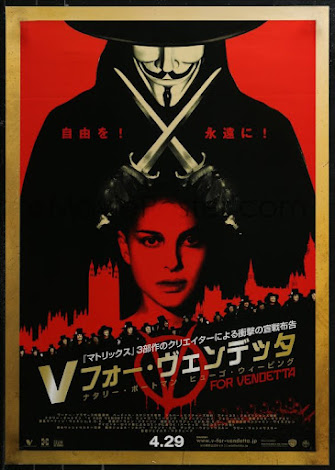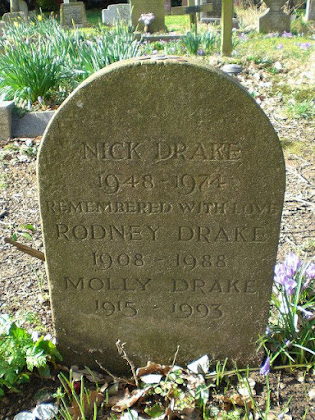V for Vendetta 2006 .... some posters
Movie Posters: A Matter of Life and Death 1946 | Australian 1906-71 + MO Collection + Australian stone lithographs | Captain Marvel | Cinema Art Films| Die Grosse Wette 1916 | Don't Look Back 1967 | King Kong 1933 | Le Doulos 1962 | Lost Horizon 1937 | Metropolis 1927 + US Press Book + Japan 1929 | Ned Kelly Polski + List | Ostatni Etap 1948 | Pandora's Box 1929 | Polish Film Posters | Robert Detheux - Belgian | Smiley 1956 | Steel City Pictures / Greetings from Wollongong | The Healer 1935 | V for Vendetta 2019 | Variety 1925 |
Fight the good fight... Freedom forever!
 |
| Advance one sheet poster, 2006, 27 x 40 inches; also French 1 panel. |
[All posters US unless indicated]
V for Vendetta is a classic film. I was brought back to it in August 2019, during a quiet moment in an otherwise hectic life. It was originally released in March 2006 and grabbed me at the time, leaving an indelible mark. The basic premise of the original, ground-breaking 1988 graphic novel centred around the seemingly never-ending battle between 'good' and 'evil', in this instance through the lens of a fascist state's control and abuse of individual citizens. The filmic execution resonated with my sense of how the world should be. Portman, Weaving, Fry, Hurt - a stellar cast, each - alongside many others - perfectly placed in their display of power and vulnerability, strength and weakness, doubt and determination. This was Hollywood at its most professional and brave, channeling the ghosts of Berlin's Neu Babelsburg studios where the film was shot and where, 70 years prior, Adolf Hitler's propaganda machine was in full flight at the hands of film directors such as Leni Riefenstahl.
 |
| Phone booth poster, 2005, 26 x 50 inches. |
The movie went beyond mere political diatribe. It was moving in parts, though not sentimentally so. I shed tears at the plight of V, Evie and all those innocent victims of the Norsefire (quasi-Aryan) regime. Watching it again was difficult due to the graphic brutality and the torture, which clearly reflected the post 9/11 situation in the United States detention facility at Guantanamo Bay, Cuba. It's victims' orange clothing and violent black-bagging of heads upon detainment by the military - as though the country was at war with its own people - was evidence of the dehumanization carried out prior to torture and abuse in both the cinematic fiction and modern-day reality.
 |
| Teaser one sheet poster, 2005, 27 x 40 inches. |
Beyond that, the film presented inhumane experimentation followed by death and disposal in an earthen pit, much as the Nazis had practiced at Auschwitz and elsewhere in pursuit of the Jewish genocide known as the Holocaust, and a much wider campaign against non-Aryan minority groups such as gypsies, homosexuals and Christians and, ultimately, nearby states, including Austria, Poland and on to Russia.
 |
| Teaser one sheet poster, 2005, 27 x 40 inches. |
The historic lineage of V for Vendetta - from the fictional Orwellian 1984 and Animal Farm scenarios through actual totalitarian, fascist and pseudo-democratic regimes such as Nazi Germany, Communist China and even the modern era democracies in the United Kingdom and United States - brought to light yet again the tragic consequences of misuse of political power, high level corruption, and human rights abuses of the innocent and those who would seek to oppose illegitimate and legitimate authority. All of this struck a nerve with me, as it should.
 |
| Japanese advance B2 poster, 2005, 20 1/4 x 28 5/8 inches. |
I could see elements of the film in everyday life, with suffering the norm rather then the exception, and government politicised and corrupted to the degree that it is neither by the people nor for the people. In many instances society has become dehumanised at the hands of individuals overwhelmed with the pursuit of power and devoid of compassion. We are confronted with seemingly rational reasons for everything, no matter how brutal or inhumane, viz. refugee camps, separation of children from their families (e.g. the Stolen Generations in Australia, and the Mexican border in the US), low wages, removal of welfare, inequitable educational opportunities, denial of health care, homelessness and public vilification or humiliation at the hands of media shock-jocks.
V for Vendetta is one of those few movies that draws an emotional response from my inner sociopath. Who cares? Does anybody care? Yes, I care, but often only when I am kicked in the guts by a film such as V for Vendetta; yet another mass killing in the United States; a refugee body washed up upon a distant shore; or a report of torture, rape and murder in a Tibetan prison, to name but a few examples of the ever-present horror we humans bring upon each other.
At its core V for Vendetta is the story of a vigilante, a freedom fighter, a so-called modern day 'terrorist' - at least in the eyes of a terror-inducing authority and a seemingly uncritical populace with an almost religious faith in the media and political leadership. If this uncritical mass reads it in the paper, or sees it on the news, then they assume - and believe - it must be true. Yet American President Donald Trump and his media mouthpiece Fox News reveals the inherent dangers of such misplaced trust in authority, wherein lies and bias are commonplace, as are sins of omission. The truth is in plain sight, yet regularly disregarded in preference to official spin and base reportage which seeks to instill fear in the general populace. We look the other way when it comes to the brutality of regimes such as exist in North Korea, Communist China, Saudi Arabia and West Papua. Our outrage is conditional upon the triggers with which we are manipulated - media, government, religion - rather than the truly horrific nature of the abuse.
The original V for Vendetta graphic novel, and the subsequent film adaptation, propose that in many instances vengeance is the only form of justice in an unjust, brutal world. Though this may be an attractive and practical solution, it will always be ethically problematic. Our (Western) criminal justice system was meant to be an alternative to "an eye for an eye" and all forms of discrimination, but in lieu of the harsh reality of the legal system's own corruption, politicisation, and use of unwarranted incarceration and capital punishment, the role of the vigilante remains on the table. V. The fight must go on, therefore, for true justice in the face of political and religious extremism (often intimately connected), fascism, barbarity, racism, discrimination, greed, and abuse of the weak and innocent by those in positions of power. The church and state cannot be relied upon to do its duty, for it has failed miserably in the past, and will continue to fail into the future.
 |
| Teaser one sheet, 2005, 27 x 40 inches. |
Our democratic political and legal systems were meant to be honest, equitable and humane. Yet they repeatedly let us down, veering towards fascism on a regular basis. The Hong Kong riots of 2019 are an all too common example of this repression in the face of the fight for freedom, though Communist China has never claimed to be democratic or legally ethical and just. In the latter case, their criminal justice system is merely a branch of the Chinese Communist Party, just as the justice system in Germany under Hitler was an arm of the NAZI party. One only has to look at the long-standing and tragic situation in Tibet and Mongolia, and elsewhere to Middle Eastern countries such as Saudi Arabia, to see this abuse of the legal system by government. Whether covert (hidden), or overt as in the case of war, so-called righteous endeavours against the innocent are ubiquitous.
 |
| Teaser one sheet poster, 2006, 27 x 40 inches. |
Another element of the film which is well developed is the presence of fear in everyday life - a fear that is heightened by government, business and the media. Portman portrays vulnerability and fear from the outset, encountering it daily at work, on TV, and whilst walking the streets. Posters, police, and surveillance are everywhere. There is no privacy; no protection against intrusion; no immunity against unjust laws as authority seeks to 'prevail' over the individual. It is only after her shocking 'torture' by V, wherein she faces death and accepts it, that Evie overcomes the fear that has bound and haunted her since childhood. We all have fear - for ourselves, for others, and for the future. To be brave and fearless are virtues worth striving for, and even fighting for. V for Vendetta encourages us to be fearless.
In reading reviews of the film from around the time of its initial release, it is concerning to see how those from the conservative British establishment were often negative, whereas elsewhere the reviews were positive in regards to the strong anti-fascist, pro-democratic position taken by the production. The former is clearly unwarranted, though in many ways to be expected, considering the theme of the work, its London setting and initial anti-Thatcher government scenario adopted by writer Alan Moore and artist David Lloyd. V for Vendetta is undoubtedly a classic of the genre, both as original graphic novel and filmed adaptation. It will forever remain a fiction grounded in fact, and a prick to one's conscience.
The images on this page are a mixture of official release movie posters and subsequent art prints developed by fans in reaction to the film and its iconography.
 |
| Special poster, 37 x 77 inches. |
 |
| Subway poster, 46 x 60 inches. |
------------------------
Movie Posters: A Matter of Life and Death 1946 | Australian 1906-71 + MO Collection + Australian stone lithographs | Captain Marvel | Cinema Art Films| Die Grosse Wette 1916 | Don't Look Back 1967 | King Kong 1933 | Le Doulos 1962 | Lost Horizon 1937 | Metropolis 1927 + US Press Book + Japan 1929 | Ned Kelly Polski + List | Ostatni Etap 1948 | Pandora's Box 1929 | Polish Film Posters | Robert Detheux - Belgian | Smiley 1956 | Steel City Pictures / Greetings from Wollongong | The Healer 1935 | V for Vendetta 2019 | Variety 1925 |
Politics: | Acolyte | Bill of Rights 2004 | COVID-19 | Elon Musk | Fascism | Media 2022 | MH370 | Parliament 2002-4 | Pauline Hanson cartoons | Raygun | Song of the South | Torture | Transgenderism | V for Vandetta | Wind farms | Woke | Women sports | Workplace relationships |
Last updated: 14 October 2024
Michael Organ, Australia (Home)







Comments
Post a Comment